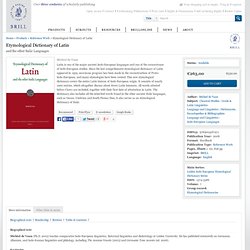Latin Etymological
Octopi, the supposed plural of octopus, is a favorite among fans of quirky words, but it has no etymological basis. The form was created by English speakers out of a
Latins referred originally to an Italic tribe in ancient central Italy from Latium. As Roman power and colonization spread Latin culture, Latins came to mean mostly
passion (n.) late 12c., “sufferings of Christ on the Cross,” from Old French passion “Christ’s passion, physical suffering” (10c.), from Late Latin passionem
Jun 12, 2017 · Derived terms . vindex; violēns / violentus; violō; References . vis in Charlton T. Lewis and Charles Short (1879) A Latin Dictionary, Oxford: Clarendon
Information about English words derived from Latin and Greek sources and English vocabulary words with etymologies plus explanations. and quizzes
Information about English words derived from Latin and Greek sources and English vocabulary words with etymologies plus explanations. and quizzes

Define etymology: an explanation of where a word came from : the history of a word — etymology in a sentence
Etymology. The word gringo was first recorded in Volume II of the Diccionario castellano con las voces de Ciencias y Artes y sus correspondientes en las 3 lenguas



Homo sapiens (n.) the genus of human beings, 1802, in William Turton’s translation of Linnæus, coined in Modern Latin from Latin homo “man” (technically “male human
The Wheelock’s Latin Series isn’t complete without: Wheelock’s Latin Reader. Originally intended as a sequel to Wheelock’s Latin, this is the ideal text for





